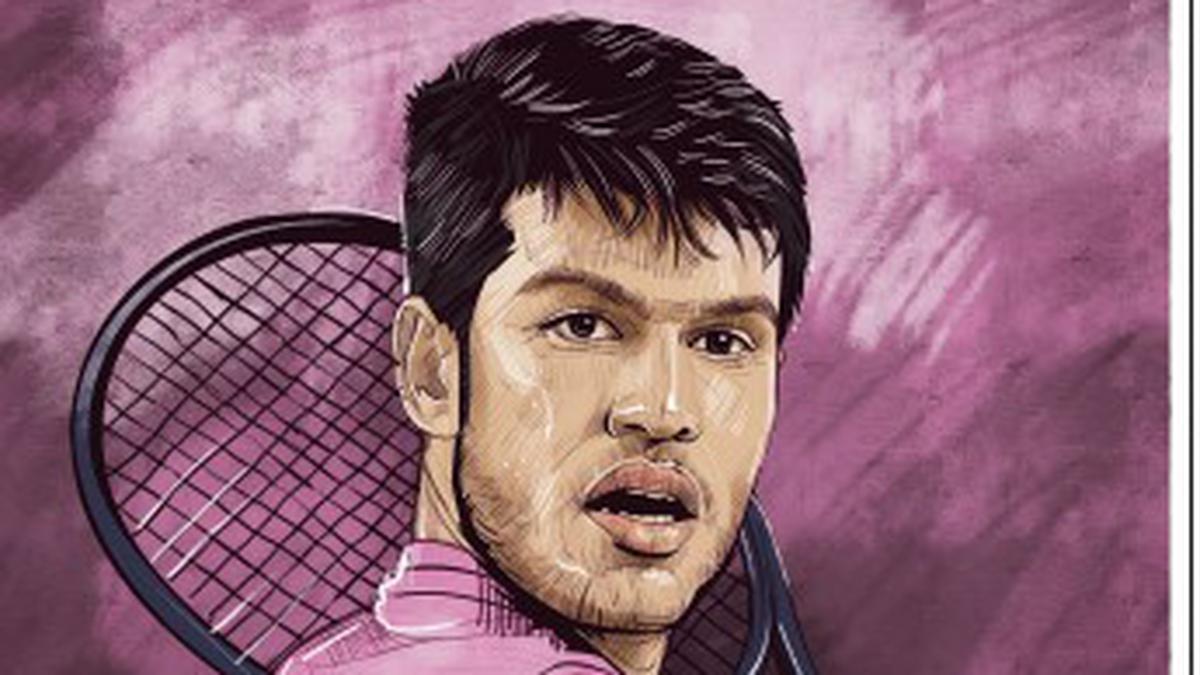
Carlos Alcaraz | A new heir to the tennis throne Premium
The Hindu
Carlos Alcaraz has shaken the foundations of men's singles tennis, ending Novak Djokovic's reign and restoring unpredictability to the game. His 12 Tour titles across three surfaces, two of which are the most prestigious (Wimbledon and Queen's), and his ability to summon a point-ending shot when needed, make him a generational talent. His coach believes he could win 10-15 Slams, but even if he ends up with five or six, he is too important for the sport.
In contemporary sport, nothing has given into such extreme consolidation of power quite like men’s singles tennis. In the two decades from Wimbledon 2003 to French Open 2023, the trio of Roger Federer, Rafael Nadal and Novak Djokovic have swept 65 of the 79 Grand Slam tournaments. In seven of the remaining 14, one of the three was in the final.
The reasons may be many — superior racquet technology, the homogenisation of courts and better fitness standards — but such empire building activity was unseen. A few signs of rebellious unrest were displayed by Andy Murray and Stan Wawrinka, who won three Majors each. But they were quelled with characteristic menace, as the ‘Big Three’ left little to no room for the inherent chaos in the game to rise up and cause a churn.
That such an imposing edifice is right now being shaken to its foundations is down to Carlos Alcaraz, the 20-year-old reigning World No.1 who beat Djokovic in last Sunday’s Wimbledon final over five pulsating sets lasting nearly five hours. Just last month, Alcaraz suffered stress-induced full-body cramps against Djokovic in the French Open semifinals. And when he lost the first set of the final 1-6 and was down a set-point in the second-set tie-break, it seemed like a repeat act.
However, the Spaniard underwent a stunning transformation, energised by the stage and drawing from the audience’s energy, to win his second Slam after the US Open last year. In doing so, he handed Djokovic his first defeat in a five-set Major final since Murray beat him in the 2012 US Open, and denied his opponent a men’s record-extending 24th crown and a record-tying eighth Wimbledon trophy (with Federer).
It didn’t matter that Djokovic was the four-time defending champion, hadn’t lost at the iconic Centre Court since the 2013 final reverse to Murray and was last defeated in a completed match at SW19 by Sam Querrey in 2016. In fact, Federer last overcame Djokovic at a Slam in 2012. Nadal has not beaten Djokovic anywhere on the Tour outside clay since the 2013 US Open final. The ‘Next Gen’ talents of Dominic Thiem, Daniil Medvedev, Stefanos Tsitsipas, Matteo Berrettini, Nick Kyrgios and Casper Ruud have collectively won one of eight Major finals against Djokovic.
That Alcaraz found a way to permeate the Serb’s airtight record may well be his genius. Entering the grass swing, Alcaraz was unseasoned. He had only played six Tour-level matches on the surface, across two Wimbledons in 2021 and 2022. But he displayed all the quintessential tenets of lawn tennis to go undefeated at Queen’s Club and Wimbledon.
Alcaraz served well and his forehand speed was phenomenal, as seen from the very many shots he hit over 100mph. He even employed an abbreviated forehand with a less elaborate routine to counter the speed at which the ball comes off the grass. His volleying was first-rate, footwork excellent and the transition from the back to the forecourt resembled that of a grass-court natural. He took up aggressive returns positions and blocked, sliced and lobbed his way out of trouble. And those audacious, nerveless drop shots he executed imparted the kind of texture and colour to his game that is usually associated with generational talents.











